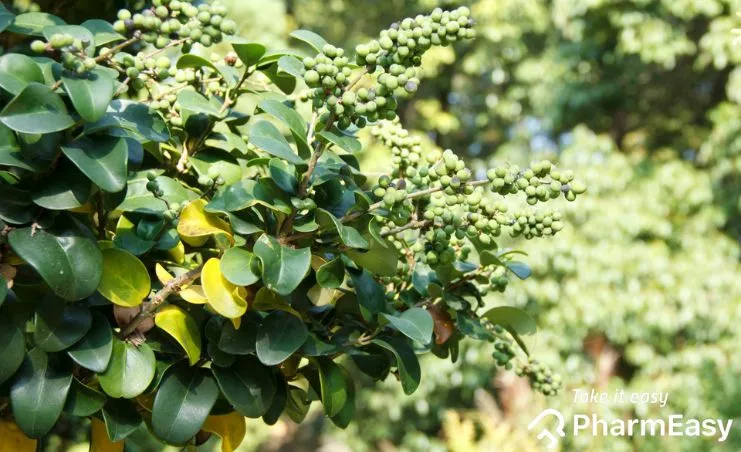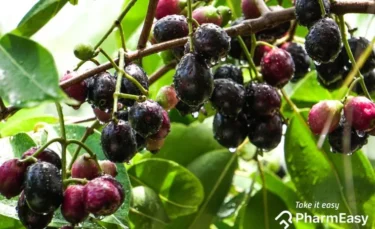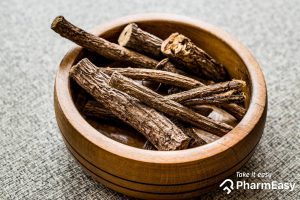Guggul is a small shrub or tree which is approximately 6 m tall with very thick bark and thorny branches. A guggul tree is known for its gummy resin which is tapped or harvested from its bark. Guggul tree is tapped from November to January so that the gum or resin can be collected from May to Jun.
Guggul tree yields about 700 to 900 g of gum or resin annually. The name Guggul which means the one which can protect from diseases. The resin of the plant has shown its use in balancing doshas like Vata and Kapha. The resin has a unique essence and when it is sprinkled on hot coal, it gives a dense smoke with a fragrant.

Due to this, it is used in making dhoop and essence sticks. Guggul plant contains a mixture of phytochemicals like steroids, gum, flavonoids, lignan, essential oil, myrrhanol, guggulsterone, and guggulipids are used in treating various diseases.
Table of Contents
Types of Guggul
Mahanila, Mahishaksha, Padma, Kumuda, and Hiranaya are five different types of Guggul available.
Other Names for Guggul
Guggul is known by different names in different languages such as:
- In Hindi: – Guggul.
- In Marathi: – Guggala.
- In Tamil: – Gukkulu.
- In Telugu: – Guggipannu.
- In Sanskrit: – Guggulu.
- In English: – Indian bdellium.
- In Kannada: – Kanthagana.
- In Gujarati: – Gugal.
Phytochemical constituents of Guggul
Guggul plant contains different phytochemicals that have medicinal importance in treating different diseases. Guggul contains 32% gum, 1.45% essential oils, sucrose, fructose, amino acids, flavonoids, α-camphorene, ellagic acid, sterols such as guggulsterone, β-sitosterol, Z- and E-guggulsterone.
From my knowledge, type 2 diabetes affects a sizable portion of the global population. The gum resin of the Guggul tree is believed to be quite effective against diabetes. Researchers believe that the risk factors for type 2 diabetes may be drastically reduced with regular Guggul use.
Dr. Rajeev Singh, BAMS
Benefits of Guggul
- Guggul is known for its anti-inflammatory properties and some of the research showed it is beneficial in treating acne, psoriasis, arthritis, and eczema.
- Guggul is found beneficial in the treatment of severe forms of acne in the chest, back, and face.
- Guggul products have shown better results on people with oily skin and suffering from acne problem,
- To avoid the itchiness and skin discoloration related issues Guggul extracted from the Boswellia serrata was found to be effective in treatments.
- Guggul is helpful in metabolism and it also reduces hunger like feeling.
- Guggul formulations are very effective in treating the obesity problem.
- Guggul extracts intake can help in improving the uptake of iodine in the body and thereby improve the function of the thyroid gland to avoid hypothyroidism.
- Guggul has a Vata balancing property due to which it is useful in treating osteoarthritis in which there will be severe pain and swelling in the joints.
Uses of Guggul
- Guggul can help in the reduction of bad cholesterol produced by the body and therefore it is used for treating hyperlipidemia.
- The Guggulsterone of Guggul extract acts as an antagonist and it has a great impact in decreasing the cholesterol level in the liver.
- Guggul is useful in treating patients suffering from constipation, piles, worms, and liver disorders.
- Guggul is useful for asthma and chronic cough problems.
- Guggul extract is used to increase the sexual problem, impotence as well as to treat infertility related issues.
- The individuals suffering from facial paralysis and gout problems are recommended to take Guggul formulations.
- Since ancient times Guggul has been used in the treatment of obesity and diabetic patients.
- The intake of Guggul regularly is useful in enhancing the lipid metabolism and it can further help in the burning of excess body fat.
- Guggul extract contains gugulipid or guggulipid that has been used as Unani and Ayurvedic medicine for the past 3000 years.
Over the years, I have observed that skin conditions like eczema and psoriasis, which involve inflammation of the skin, may be challenging to manage. However, I have found that Guggul, a natural remedy, might offer some relief. Based on studies, medications containing the active component of Guggul may potentially improve redness and other superficial skin issues.
Dr. Siddharth Gupta, MD
Recommended Dosage of Guggul
Guggul products are available in the form of capsules, extracts, powders, and lotions which are available in medical stores and online pharmacies.
| Products | Preparation | Dosage/ Day |
| Guggul powder/ extract | Add ¼ teaspoon of Guggul extracts or powder in lukewarm water and sip it. | 1 to 2 times |
| Guggul Tablet | It should be taken with lukewarm water. | 1 – 2 tablets, 2 times |
| Guggul capsule | It should be taken with lukewarm water. | 1 – 2 tablets, 2 times |
| Guggul paste | Guggul powder is mixed with an adequate amount of water to make the thick paste for its application on joints to avoid pain. | Once |
Side effects and precautions while using Guggul
- Guggul is considered safe when administered in the recommended dosage.
- Taking Guggul with the medication should be avoided as it slows down the blood clotting which can further increase the chances of bleeding and brushing.
- Guggul has interference with the estrogen produced by birth control pills, therefore it is advised to talk to the medical practitioner before its consumption which might help in avoiding any side effects.
- The angina is the effect where the chest pain is related therefore the diltiazem is used to prevent the angina attacks but when Guggul is administered, it reduces the absorption of diltiazem by the body so precautions should be taken during such situations.
- Irregular menstrual cycle, diarrhea, hiccups, and nausea are some of the side effects of the Guggul.
- There is some scientific evidence showing that the higher dosage of Guggul is related to the cause of liver damage so it should be taken with proper prescription from doctors.
- Guggul is unsafe for pregnant women as it can increase the menstrual flow and tend to stimulate the uterus. Sometimes in early labor pain, it can lead to miscarriages.
- It is necessary to avoid the use of Guggul 2 weeks before the surgery as it can increase the chances of bleeding during surgery.
FAQs
What is Guggul?
Guggul is available in the form of resin or gum which is tapped and separated from the bark of the Commiphora Mukul tree. The Guggul resin is used as an ayurvedic medicine to treat different diseases and is used as a remedy for treating skin-related issues.
How to take triphala Guggul?
Triphala Guggul is found to be beneficial in Vata related problems, fistula, paralysis, and other diseases. It also regulates the menstrual cycles and enhances the growth of WBC. The Guggul Triphala is mostly available in the form of tablets and can be taken as 1 to 2 tablets in the morning and evening with lukewarm water as per doctors’ suggestions.
Is Guggul good for hypothyroidism?
Yes, it is good for hypothyroidism treatment. Guggul helps in enhancing the function of the thyroid gland which further helps in increasing the production of thyroid hormones through the enzymatic approach.
Can I have Guggul during pregnancy?
No, the Guggul is unsafe during pregnancy. There are clinical studies that showed that the Guggul has interference with the estrogen produced by the body and due to which it can cause the uterine contraction and during early pregnancy phases it can lead to miscarriages.
Is Guggul beneficial for Acne treatment?
Yes, Guggul extract is rich in an anti-inflammatory and antibacterial compound. The oral intake of Guggul can reduce sebum production in the skin and thereby inhibit the growth of acne-causing bacteria. From scientific studies, it is also found that Guggul is very effective in treating oily skin.



 By
By 










Comments